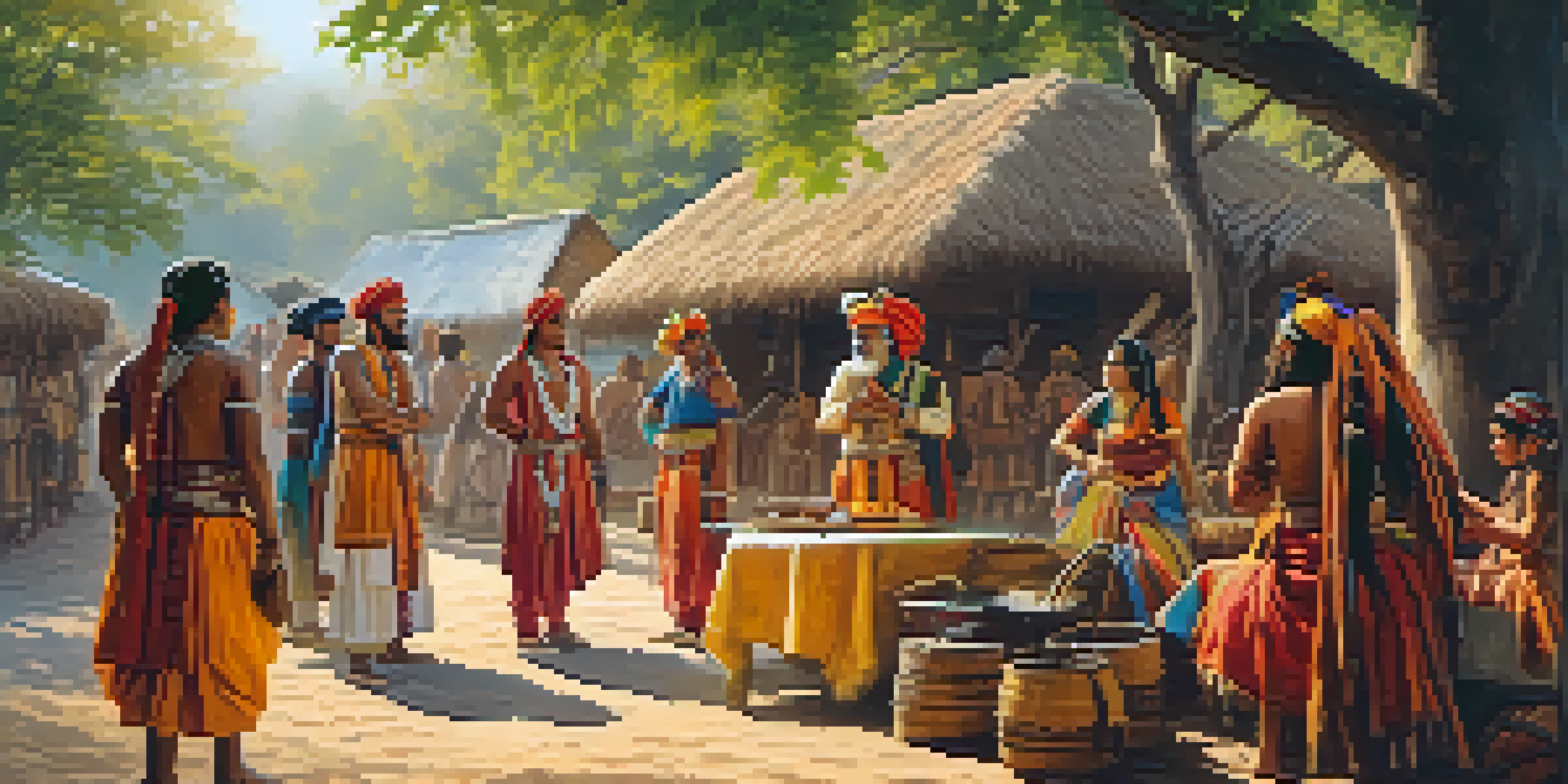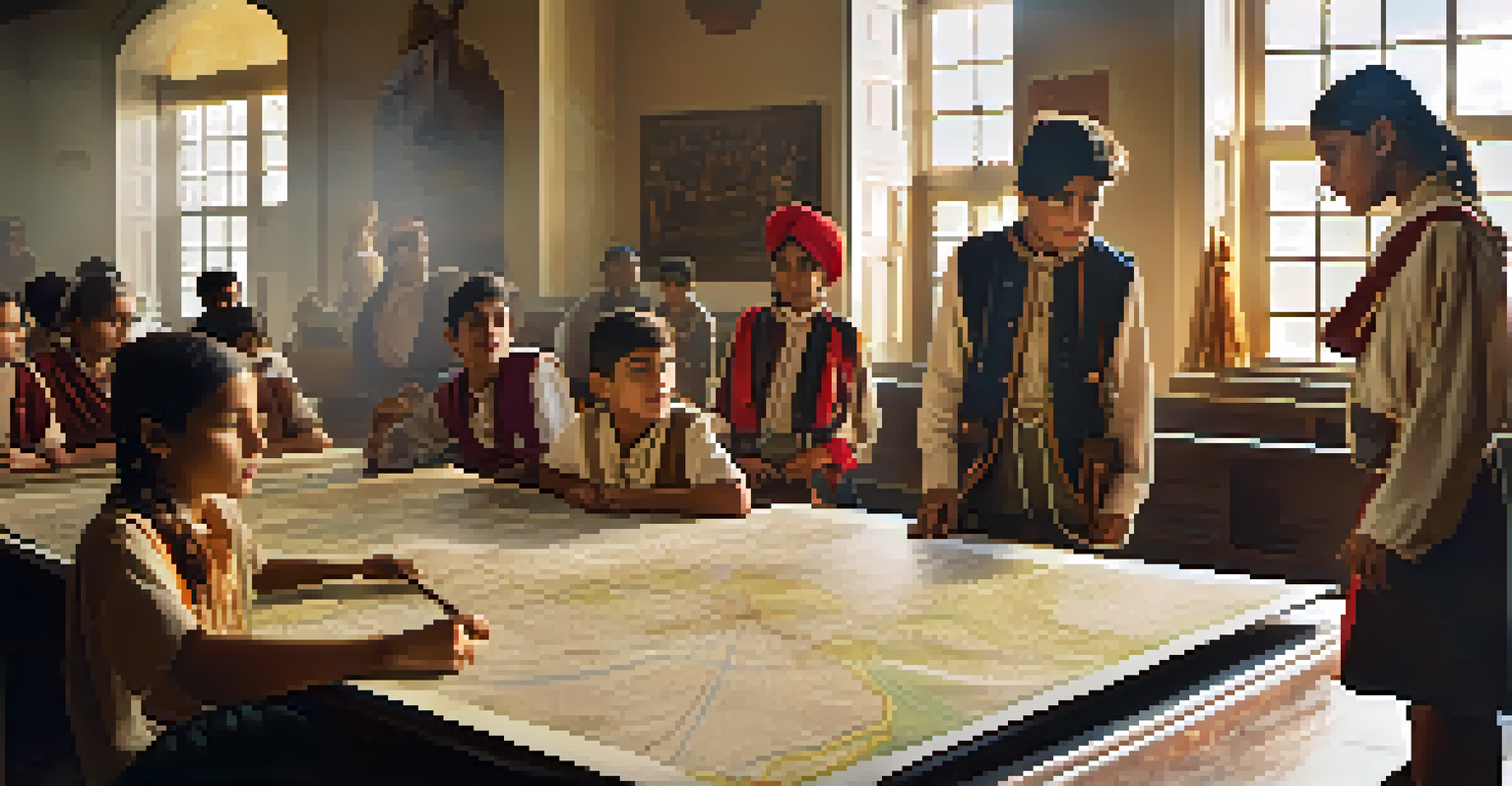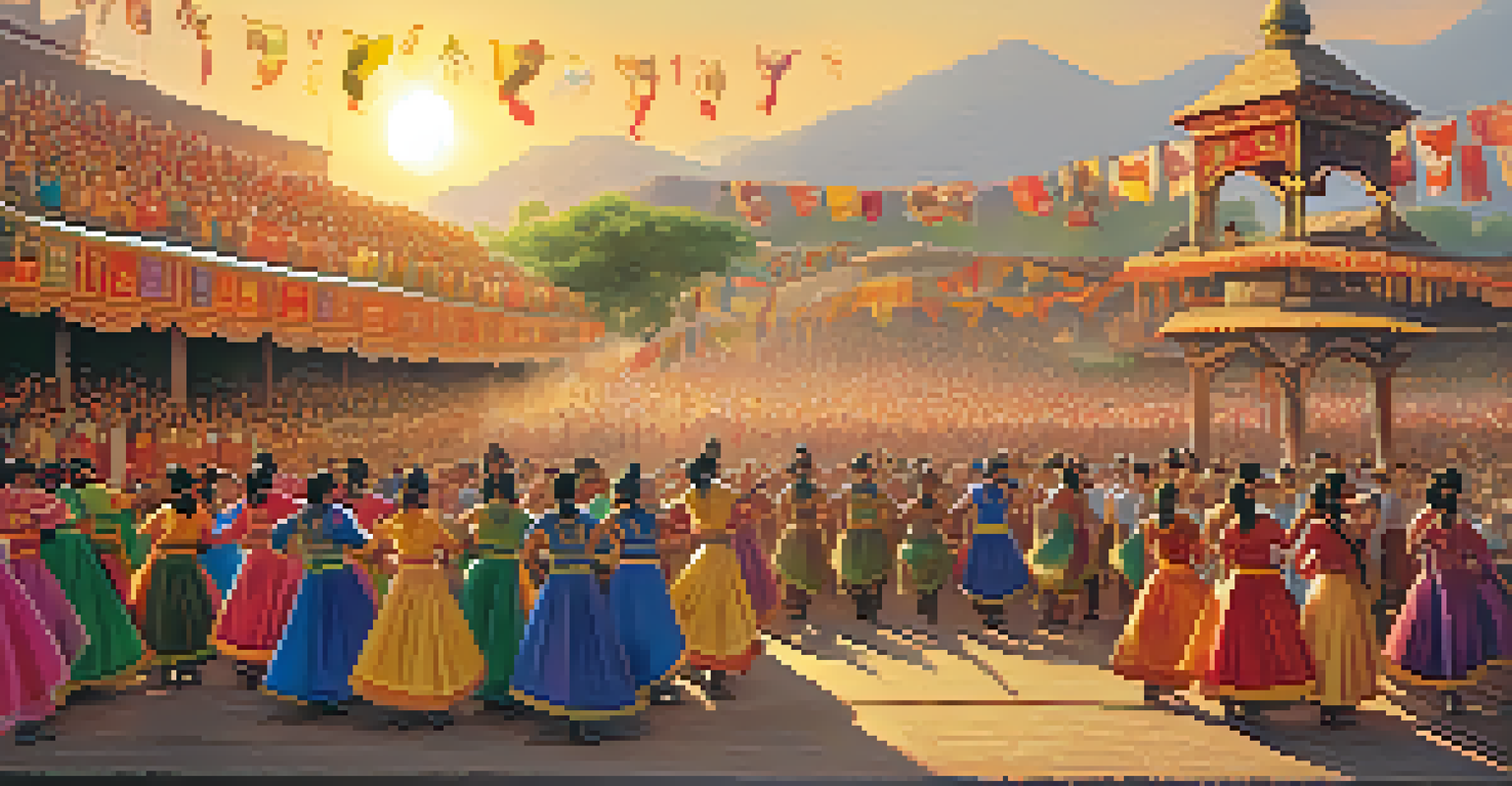The Impact of Historical Reenactments on Modern Indian Society

Understanding Historical Reenactments in India
Historical reenactments in India serve as a bridge connecting the past with the present. They involve the recreation of significant events, traditions, or lifestyles, allowing participants and audiences to engage with history in an immersive way. From epic battles of the Mahabharata to cultural festivals showcasing ancient crafts, these reenactments breathe life into historical narratives, making them accessible and relatable.
Those who cannot remember the past are condemned to repeat it.
These events often take place in various forms, including theatrical performances, festivals, and educational programs. They not only entertain but also educate participants about the cultural heritage and values that shape modern Indian identity. By walking in the shoes of historical figures, people gain a deeper understanding of their roots and the complexities of India's past.
Moreover, reenactments encourage communities to come together, fostering a sense of belonging and collective identity. As individuals don traditional attire and immerse themselves in the roles of their ancestors, they contribute to a shared storytelling experience that strengthens intergenerational bonds and cultural pride.
Cultural Preservation Through Reenactments
One significant impact of historical reenactments is their role in cultural preservation. In a rapidly modernizing world, these events serve as a reminder of India's rich traditions and diverse histories. They often focus on lesser-known narratives that might otherwise fade away, ensuring that multiple voices and experiences are honored and remembered.

By showcasing traditional crafts, music, and dance, reenactments help to sustain local art forms that are integral to community identity. For instance, artisans may demonstrate age-old techniques, allowing younger generations to learn and appreciate their heritage. This transmission of knowledge ensures that cultural practices remain vibrant and relevant.
Cultural Preservation through Reenactments
Historical reenactments play a crucial role in preserving India's rich traditions and diverse histories, ensuring that lesser-known narratives are honored and remembered.
Additionally, these reenactments can attract tourism, providing economic benefits that incentivize communities to maintain their cultural heritage. When people from various regions gather to witness these events, it not only boosts local economies but also promotes intercultural dialogue and understanding among diverse groups.
Educational Value of Historical Reenactments
Historical reenactments offer unique educational opportunities, transforming the way history is taught and learned. Instead of passively absorbing information, participants actively engage with the material, making learning more impactful and memorable. This interactive approach caters to various learning styles, ensuring that history resonates with a broader audience.
History is not a burden on the memory but an illumination of the soul.
For students, reenactments can supplement traditional classroom education, providing a tangible context to historical events. When they witness or participate in a reenactment, they can better grasp the nuances of cultural shifts and societal changes throughout India's history. This experiential learning fosters critical thinking and sparks curiosity about the past.
Moreover, educators can use these events as platforms to introduce discussions on pertinent social issues, encouraging students to draw parallels between historical events and contemporary challenges. This connection fosters a deeper understanding of how history shapes present realities and empowers students to think critically about their role in society.
Community Engagement and Identity Building
Historical reenactments often serve as a catalyst for community engagement and identity building. By organizing and participating in these events, individuals develop a strong sense of connection to their local history and culture. This engagement can lead to increased civic pride and a commitment to preserving cultural heritage.
Additionally, these events provide platforms for dialogue and collaboration among different community members. They encourage people from various backgrounds to come together, share their stories, and celebrate their shared history. This unity can dissolve barriers and foster mutual respect, reinforcing the importance of inclusivity and diversity within the community.
Educational Value of Reenactments
These events transform history education by providing experiential learning opportunities that engage participants and foster critical thinking.
Furthermore, by participating in reenactments, individuals can redefine their personal identities in relation to their historical narratives. This exploration of identity can be especially empowering for marginalized groups, allowing them to reclaim and celebrate their histories and contributions to society.
The Role of Technology in Modern Reenactments
In recent years, technology has dramatically changed the landscape of historical reenactments. From virtual reality experiences to online streaming of events, technology has made it easier for people to engage with history from anywhere in the world. This accessibility allows a more extensive audience to appreciate and learn from these reenactments.
Moreover, social media plays a crucial role in promoting historical events and connecting enthusiasts. Participants can share their experiences, photos, and videos online, creating a community of like-minded individuals passionate about history. This digital engagement cultivates a sense of belonging and encourages more people to participate in future reenactments.
However, the integration of technology also raises questions about authenticity and representation. While it can enhance the experience, it's essential to balance modern mediums with traditional storytelling methods. Striking this balance ensures that the essence of historical reenactments remains intact while appealing to contemporary audiences.
Challenges Faced by Historical Reenactments
Despite their benefits, historical reenactments are not without challenges. One significant issue is the potential for historical inaccuracies, which can arise from oversimplifying complex events or focusing too much on entertainment value. This can lead to misconceptions about history, making it essential for organizers to prioritize accuracy and thorough research.
Additionally, organizing reenactments can be resource-intensive, requiring funding, volunteers, and venues. Many community groups may struggle to secure the necessary support, leading to limited opportunities for participation. Addressing these challenges is crucial to ensuring that reenactments remain sustainable and impactful.
Community Engagement and Identity
Reenactments foster community engagement and identity building, uniting individuals through shared history and promoting inclusivity among diverse groups.
Moreover, the rise of commercialization in some reenactments can dilute their educational and cultural significance. When events prioritize profit over authenticity, they risk losing their connection to the communities they represent. It’s vital for organizers to navigate this delicate balance, ensuring that historical reenactments continue to serve their primary purpose of fostering understanding and appreciation of history.
Future Directions for Historical Reenactments in India
As historical reenactments continue to evolve, there are exciting possibilities for their future in India. One potential direction is the integration of more diverse narratives, including those of marginalized communities. By highlighting a broader spectrum of voices, these reenactments can foster a more inclusive understanding of history.
Additionally, the incorporation of educational partnerships with schools and universities could enhance the academic value of reenactments. Collaborating with educators to develop curricula around these events can create a comprehensive learning experience that enriches students’ understanding of their cultural heritage.

Finally, as technology advances, we may see even more innovative approaches to reenactments, such as interactive exhibits or augmented reality experiences that allow participants to engage with history in new ways. By embracing change while honoring tradition, historical reenactments can continue to play a vital role in shaping modern Indian society.